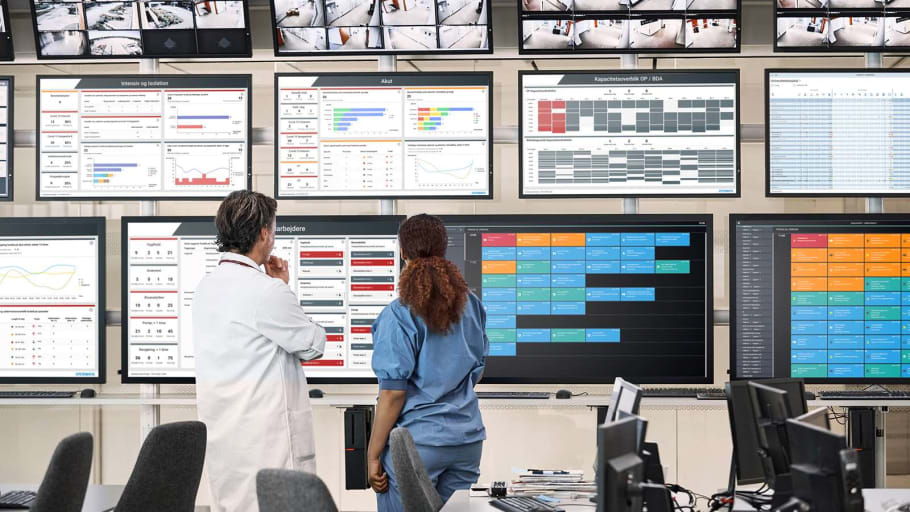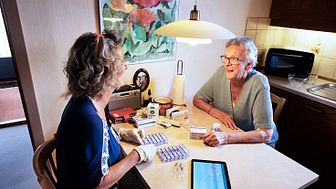
Hospitals using Systematic’s software among the smartest worldwide
Three Scandinavian hospitals using Systematic’s software are in the top 25 of 250 hospitals worldwide ranked in leading in integrating and using new, smart technology.
The American news magazine Newsweek has, in collaboration with the data research firm Statista Inc, compiled a list of 250 of the world’s best and smartest hospitals – the ‘World’s Best Smart Hospitals 2021’. Smart hospitals are particularly good at using data and technology to improve how they treat patients and perform daily hospital tasks.
And this is exactly where Karolinska University Hospital in Stockholm and the two Danish university hospitals in Aarhus and Aalborg excel in particular. Common to all three hospitals – which are ranked 8, 19 and 21 on the list – is that they use Systematic’s software to plan and optimise hospital operations.
Patients are expected and welcome

Aarhus University Hospital is ranked a few places up the list as the nineteenth best smart hospital in the world.
According to Jørgen Schøler Kristensen, Chief Medical Officer, the hospital’s extensive use of data makes it possible to give patients a feeling that they are expected and welcome.
“When a patient comes to be treated by us – whether planned or an emergency – the healthcare professionals can easily find the patient’s medical records and look at their medical history, previous courses of treatment and other relevant information. This means that our patients feel both expected and welcome, which is important for a good, safe and reassuring course of treatment,” explains Jørgen Schøler Kristensen.
The COVID-19 pandemic in particular has shed light on how many resources can be saved by using data in daily hospital operations.
“Well-functioning IT systems enable us to handle crisis situations like COVID-19 more effectively. We’ve been using digital logistics systems to control patient flow, which has been a great help for patients and staff alike. Not just at one hospital, but across all the hospitals in the region with a real-time overview. We’ve also seen the advantages of being able to make changes quickly in the IT systems so that they support the new conditions in a crisis situation.”
Digitalising hospitals frees up time for patients
At Aalborg University Hospital, which ranks 21 on the list of the world’s best smart hospitals, there is a clear strategy for working with digitalisation and how healthcare professionals should work smartly in future. Klaus Larsen, IT director at North Denmark Region, says:
“When we work with data, we reduce the risk of human error. A large database, for example, allows doctors to predict complex disease pathways and make informed decisions on the most appropriate treatment for a citizen based on the data we have at our disposal. This means that fewer patients are discharged prematurely, which results in fewer readmissions,” he says.
According to Klaus Larsen, treating patients well reflects the fact that the more digitalised the hospitals are the more time the hospital staff have for patients.
“Digitalisation is actually more about people than about technology. We talk about automation, data and monitoring in the health sector, but we’re only doing so because it provides our patients with better, safer and more effective treatments. It may seem paradoxical, but the more we digitalise and automate the health sector, the more time hospital staff will have to attend closely to the citizen,” says Klaus Larsen.
Citizen-centered solutions
Aarhus University Hospital and Aalborg University Hospital benefit greatly from Systematic’s Columna solution, giving staff an overview of each patient’s treatment and medication while also managing tasks such as blood sampling and the transport of patients and equipment.
Columna provides staff with a list of which tasks need to be performed, where the tasks are to be carried out, and which tasks are most urgent on their smartphones. In this way, the tasks are efficiently and appropriately completed, while at the same time minimising the distances employees have to walk and saving time by assigning the tasks which lie closest.
“There is no doubt that smart solutions like Columna are helping the hospitals – and leading to greater peace of mind and safety for patients. In the past, staff in hospitals were interrupted to a far greater extent in the course of their working day. Back then, telephones rang continuously in everyone’s pockets from porters to bioanalysts as they moved patients around or were busy taking blood samples.
Today, employees can stay focused on the patient and their work, because the task assignments simply tick into a list which can be accessed on their smartphone once they’ve finished what they’re doing. This improves the overall experience for patients, and is less stressful for employees,” explains Henrik Jespersen, Group Senior Vice President at Systematic
You may also like
Categories
- Android (3)
- Antivirus (1)
- Artificial Intelligence (AI) (20)
- Automobili (6)
- Bitcoins (6)
- Blockchain (8)
- CAREER (18)
- Cloud Computing (15)
- Cybersecurity (28)
- DEVELOPMENT (20)
- Digital Transformation (62)
- EDUCATION (20)
- FINANCE (99)
- HEALTHCARE (98)
- Home Security Systems (2)
- IGAMING (12)
- Internet of Things (IoT) (28)
- Laptops (8)
- NEWS (351)
- Printers (2)
- PRODUCTS (90)
- RETAIL (31)
- Routers (8)
- SECURITY (60)
- Servers (13)
- SERVICE (12)
- Smartwatches (2)
- Storage (2)
- Streaming Devices (13)
- SUSTAINABILITY (56)
